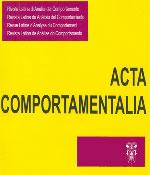Automonitoria na competência social: Análise das classes e indicadores comportamentais
Contenido principal del artículo
Resumen
The concept of self-monitoring, in a historical analysis, is understood from three perspectives: as a construct, initially defined in Cognitive Psychology by Mark Snyder; as a procedure, as used in behavioral therapy; and as metacognitive and affective-behavioral ability, basis for social competence, as it is adopted in the theoretical-practical field of Social Skills (SS). Firstly, the aim is to differentiate the concept of self-monitoring, comparing these three perspectives. Both Snyder’s proposal and the concept from the field of SS require that individuals discriminate social stimuli, control and regulate behaviors and feelings, and identify feelings and behaviors of others as well. However, the main difference is that, for Snyder, self-monitoring seems to be at the service of the individual’s social adequacy and positive image projection, although incongruent with his thoughts and feelings. This contradicts the coherence between thoughts, feelings and behaviors, an element of social competence. When comparing the proposal of self-monitoring as clinical procedure with that of the SS field, similarities are observed, as focus on the skills of observation and description of their own behavior and identification of environmental variables. The main difference is that, as a procedure, it constitutes a mode of intervention aimed at different therapeutic behavioral goals. In the SS field, selfmonitoring is a psychological process at the service of social competence. In this sense, the conception of self-monitoring in the SS field has its specificities and it needs to be understood and adopted from this. Considering self-monitoring in the SS field and the need for a greater specification of the indicators, the objective of the study is to present a list of open or covert behaviors that could be taken as behavioral indicators of this skill; from the analysis of some Behavior Analysis concepts (self-knowledge, self-control, self-regulation), relating them to the implicit or explicit components of self-monitoring ability. From this analysis, a proposal of behavioral indicators that could be included is presented. Based on it, these indicators that could guide the evaluation and promotion of the self-monitoring and its role in social competence are listed, among them: (1) Identify the social stimuli that constitute a demand for a social response; (2) Discriminate, responding differently to them; (3) Observe, identify, name and describe one’s own public and covert behaviors (thoughts and feelings) as well as those of others; (4) Identify alternative responses; (5) Predict possible consequences of these alternatives; (6) Choose and issue responses under the control of delayed environmental consequences and with greater magnitude of reinforcement; (7) Describe the past behavior and its consequences, using it to plan and change one’s performance based on response alternatives and their likely future consequences; and (8) Regulate own performances while they are occurring due to changes in demand and prediction of consequences. From the perspective of Behavior Analysis, some implicit or explicit concepts in the definition of self-monitoring are discussed, such as self-knowledge, self-control and self-regulation. Finally, some conceptual and methodological aspects of evaluation are discussed, in particular, the characterization of their early indicators in psychological development.
Detalles del artículo
Cómo citar
Dias, T. P., Gisel Casali, I., Del prette, A., & A. P. Del Prette, Z. (2019). Automonitoria na competência social: Análise das classes e indicadores comportamentais. Acta Comportamentalia: Revista Latina De Análisis Del Comportamiento, 27(3). Recuperado a partir de https://www.revistas.unam.mx/index.php/acom/article/view/70627

<a rel="license" href="http://creativecommons.org/licenses/by-nc-sa/4.0/"><img alt="Licencia de Creative Commons" style="border-width:0" src="https://i.creativecommons.org/l/by-nc-sa/4.0/88x31.png" /></a><br />Este obra está bajo una <a rel="license" href="http://creativecommons.org/licenses/by-nc-sa/4.0/">licencia de Creative Commons Reconocimiento-NoComercial-CompartirIgual 4.0 Internacional</a>.
